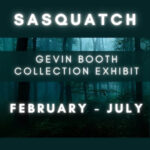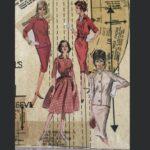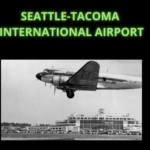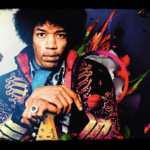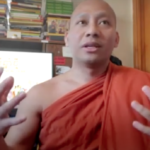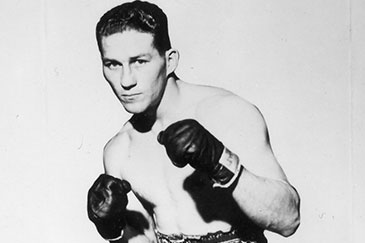Celebrity with Substance by Charles Burgess
Toward the end of his days, Mark Twain concluded that he and his fellow humans were predisposed to admire nobilities of all kinds. Wherever he journeyed, at home or abroad, he saw new proofs of this human propensity to love rubbing elbows with celebrities. Even if some notable merely passed through a populace, said Twain, the locals got an exhilarating shot of adrenalin. Should such a worthy come to stay within the community, to live and move among everyday folks, communal spirit was infused with year-around pride in its new treasure. We humans, Twain concluded, are fated to be drawn to love any such personage, whether a blue-blooded royalty “or a prizefighter.”1
Harry Lloyd Matthews (1922 — 2003) was one prizefighter who became such a community treasure. Beginning in the 1940s and through the 1950s, when the handsome young man lived among the folks of White Center, just south of Seattle on its western side, the locals buzzed about him admiringly. They traded stories of Matthews’ comings and goings and loved to read about him in their White Center News — about how, for example, he came into the newspaper office one day to get some job-work printing for a business — making wrought iron furniture and custom ornamental iron work “and whatever you like” — and while there created such unintentional havoc that “things are still not back to normal.” In 1953, editor Jerry Robinson, with neighborly tongue in cheek, noted the carnage of Harry’s visit: “We don’t blame him for idly tearing the telephone book in half. You have to keep in shape in his business. And we don’t condemn him for ripping the doorknob off the front door, although he could have got in easier if he’d known the door swings the other way.” And local readers were probably pleasantly touched and drawn even closer to Matthews when Robinson on another occasion reported his discovery that prizefighter Matthews was ticklish.2
Certainly, as Twain said, celebrity status had much to do with all this attention. But celebrity alone is ultimately brittle stuff, with little staying power in close quarters. Harry Matthews brought much more than stardom to the community table. He was a man of personal grace, friendliness, and integrity. It was in his fiber and makeup that he held the master keys to community acceptance. White Center memories of him still ring with appreciation. “Wonderful person,” “Good-hearted,” “Always willing to lend a hand,” “Everybody liked him,” “A good family man,” “Harry was really a nice guy,” “A soft-spoken gentleman,” “Harry was a fixture in the South End.”3
He never had a local bout without a devoted cluster of White Center fans to cheer him on. Other supporters settled for the vicarious shivers they felt watching Matthews work out at the local fieldhouse. Some acquaintances, meanwhile, had only the haziest appreciation of his ring prowess. And there were those who cared so much for him they would not watch him fight at all. But White Center folks were as one in having good to say about their famed neighbor and, later, fond memories to recall. Confuting Twain, it was as if Harry’s character ran ahead of his stardom, as if his personal qualities made boxing fans of his neighbors and friends.
Harry and his wife, Josephine, familiarly Jo — who once described her husband as being “like a good-looking college kid, only with better manners” — loved visiting with their neighbors and friends.4 They enjoyed regular penny-ante poker nights with folks like Alice and Don Haag or Charlie and Ella Eyers at one couple’s home or the other’s. A seasonal highlight, “The Plunge” at nearby Angle Lake, often drew Harry and Jo and their friends. There were rowboats, canoes, picnic areas with a busy lunch counter featured hot dogs, hamburgers, pies, and ice cream cones. In the open-air pavilion, there was weekend dancing, sometimes to the music of Bumps Blackwell, with a young Quincy Jones in the trumpet section. Harry enjoyed dancing but, according to one old friend, “Harry might have been a smoothie in the ring, but on the dance floor he had two left feet!” This friend also recalled an incident at the lake while dancing with the Matthews couple and a group of friends one evening: “The singer was in the middle of ‘Blue Moon,’ and just keeled over. Of all the folks nearby it was Harry who raced to her side and tried to revive her.”5
Harry could be seen regularly about White Center — working out at the White Center Fieldhouse, delivering fuel oil, getting a haircut at the local barbershop, at work on a wrought iron project, or at one or another local apartment house where, as another side job, he would come around and change locks for the owners when tenants moved away. Neighbors who passed his home on West Myrtle just off Delridge Way, might often see one or two panel trucks parked out front, either waiting for Harry’s fine-tuning touch or getting outfitted for his next trip to a favorite fishing hole in the foothills. He also had a boat and loved to take it to Elliott Bay, fishing with such local friends as Jerry Robinson.
There was a warm fit between Harry and Jo Matthews and the community of White Center in those days. Poet Richard Hugo well understood how such a fit could happen. He remembered his own White Center childhood, living in the sort of place where folks were “remarkably polite and calm”6 — the sort of place
“…where most poems
come from, the warm meaningful gestures we make, the warm ways
we search for each other in a bewildering world,
a world so terrifyingly big we settle for small
ones here we can control.”7
White Center was a place where, as editor Robinson put it, “When the chips are down there are no strangers here, only friends.”8 In the early 1950s, White Center and Matthews prospered together. The community blossomed into “a vibrant place,” Robinson recalled, with “Five grocery chain stores, three furniture stores, three drug stores, four appliance stores plus four new restaurants” gracing the community.9
In 1951, Harry Matthews added star luster to White Center by rising to national boxing prominence and being featured on the cover of boxing’s premier magazine, The Ring.10 He had won a string of 42 straight fights by that time — 3 out of every 4 by the knockout route — and in that year, while grossing more than $150,000 at venues from New York to Cleveland to San Francisco to Seattle, he was being hailed as top contender for the light heavyweight championship.11 Harry Matthews won friends and admirers both near and far. As former Seattle Post-Intelligencer sports editor John Owen remembered Matthews’ impact on the entire Pacific Northwest, “He was our fighter. People could identify with Harry.”12 At the national level the swelling ranks of Matthews enthusiasts included such luminaries as Ernest Hemingway.13
No person, however, even one whose life seems to have become an open book, is ever completely stripped of his own hidden world. As with all living souls, there remained a side to Harry Matthews no one else fully penetrated. He too had his inner life of memories, regrets, and hopes. In this, once again, Harry was like Twain — not to mention all his fellow humans.
Some mysteries about Harry the prizefighter remained unsolved simply because no one chose to ask Matthews the right questions, such as: what goes on in a professional boxer’s head as he prepares for a fight — as he waits to get his hands wrapped and gloved up, as he sits for the call to take the long lonely walk through the restive crowd to the center of the ring, as he goes to his corner and awaits the bell for round one? How does he manage, in this crucial pre-fight period, to desensitize himself to doubt, anger, and overarousal? How does he rein in his emotions and draw himself into a protective sphere of steely, high-pitched calmness? How does he deafen himself to the mounting partisan frenzies in the arena? How does he draw inner strength for the combat just ahead? What went on in the head of Harry Matthews during the more than one hundred times he prepared himself for that opening bell? Did he hear echoes of the barked commands and prophecies of his father, Lou Matthews?
“The kid will be a champion someday.”

Harry Matthews was born in Emmett, Idaho, on December 9, 1922. Soon thereafter he and his parents moved to the nearby village of Ola. It was there, when Harry was but a nine-year-old boy, that his blacksmith father decided to turn his shy son into a boxer. While his mother Frances frowned silently at her husband’s plans, Lou connected a punching bag to the living room ceiling and bolted it to the floor.14 Frances kept her thoughts to herself and sewed, Lou sat on the couch and bawled commands to Harry, and Harry tried his best to comply. Year after year the monstrous bag dominated the living room, the father dominated the son, and the mother quietly, uncomfortably sewed.
Year after year, father and son focused on that bag. Lou liked to tell his blacksmith shop customers over and over again how “the kid” was going to be a champion some day. The more sensitive and sensible of them saw fit to suggest to Lou that he should stop touting his son so loudly, lest his boasting mortify the lad. As Harry recalled, “I remember begging my dad to stop bragging me up as a fighter…. But I was stuck with it. He used to go around saying, ‘The kid will be a champion someday.’ I can feel the embarrassment all over again, thinking about it. …If I ever have a son, he’s never going to be a fighter. Don’t get me wrong, I loved my dad, but fighting’s no business for any kid.”15
In the last five years of Harry’s grade school life Harry, the bag, and his dad regularly met in the middle of the family living room. But then, in the fall of 1936, came a different world for Harry. He started high school and began to look forward to the chance to play high school basketball and baseball.16 What was happening to his focus on boxing? Did his newfound wavering away from boxing trouble his father? Were Lou Matthews’ five years of work as Harry’s boxing mentor about to go to waste?
Not if Lou could help it. He moved quickly. On New Year’s Day, 1937 — he took his son across the state line to nearby Ontario, Oregon, where he booked Harry for his first professional fight with a lad named Bud Hutchinson. To make the fight legal, Lou listed Harry’s age as eighteen. Actually, Harry had barely turned fourteen. Just looking at him, the Ontario crowd decided he was Harry “Kid” Matthews. The name stuck.
Harry’s maiden fight ended in the first round when Hutchinson went down for the count. It might have taken Harry awhile to realize it, but in fewer than three minutes his dreams of playing high school basketball and baseball had ended. He had made himself suddenly ineligible for amateur sports; he was now a professional athlete. Any plans he might have had about continuing as a high school student also died in Ontario. On that New Year’s Day, after three short months of high school, his formal education had ended as well.
As if to make certain that he had closed the door on Harry’s options, Lou booked his son for two quick follow-up fights, putting him in the ring in February and again in March of 1937. And so it went. By the time his high school class had graduated without him in the spring of 1940, Harry “Kid” Matthews had been fighting for nearly four years. With his dad in his corner he had appeared in eighteen professional fights — all in the Northwest — notching up 15 wins (11 by kayo), 2 draws, and 1 loss on points. Lou Matthews had his way with the spin his son’s life took. But Lou died in 1940, his dream of his son becoming a champion left unfulfilled.
Harry continued his fighting career, but without the same fire that his father had instilled in him. Even without those yapped commands in his ears, Harry continued to win regularly — but his style in the ring reportedly grew less assured, more cautious — and his life filled with more engulfing distractions. He found himself involved in a brief, ill-starred marriage that resulted in one daughter and a divorce. Harry won the custody battle for the girl born of the marriage. Mother Matthews, still at home in Idaho, laid down her sewing and helped Harry care for the child. His career, unsurprisingly, seemed to have lost its focus, even after signing a contract with his first manager — George Blake out of Los Angeles, a fight man with a good reputation.
But then came World War II and the draft. Harry got the call from the Army. In 1943, while on his induction furlough, he married Josephine Cintori, a young woman “of sensitiveness and intelligence.”17 The newlyweds settled into a place on the Seattle side of White Center. But Harry was away during most of his honeymoon-furlough. Having set his bride up snugly in their new home, Harry had his manager line up a couple engagements for him in order to help Jo get off to a solid financial start while he was in the service. Both fights turned out to be disasters. First, Harry traveled to Hollywood, where he lost a unanimous decision to ranking middleweight Jack Chase and suffered a broken nose in the bargain. Then, just two weeks later, his nose still askew and painful, he went to San Francisco, where he lost a heavily one-sided fight with Eddie Booker that mercifully ended in the fifth round with a TKO. He returned to his bride with his first back-to-back professional losses, with his first loss by way of a knockout, with $800, and with “a face that only Jo could love.”18 Soon he was off again, this time to his Army world.
Harry took a three-year hiatus from professional boxing while in the Army.19 By the time he began basic training, he had been fighting for seven years, in 37 matches, with a record of 30 wins (21 by KOs), 3 losses, and 4 draws. He was twenty-years-old at the time he entered the Army as a member of the Army’s amphibious forces, training near Lake Pontchartrain in New Orleans. While there he “was cited for bravery in saving four lives during a tragic training accident, when one of the boats capsized in a storm. Later Harry was assigned, as a mechanic and welder, to the 465th Amphibian Truck Company. He made one landing — on Luzon Island, in the Philippines — and eventually was discharged as a corporal in 1946.”20
What did three years of military service, living in protracted close relationship with others of his age, some of whom were good buddies — trading experiences, learning about alternative life choices, being in action, and maturing — have on Harry, especially considering that not since his grade school years had he had any sustained involvement with peers? From his early teens he had been fairly isolated from opportunities to form relationships with those of his age. Considering the experience and social texture of the last three years of his life, the death of his father, and his disastrous last two professional fights, one would not have been surprised had Harry decided to take his life in a different direction in 1946.
Once returned to civilian life, however, Harry signed a contract with a new manager, Bert Forbes, and climbed back into the ring. After all, what other profession, in an economy flooded with returning job-seeking veterans, provided as much income for his family? But this time Harry didn’t glove up automatically, out of unexamined habit. It was as if he had consciously decided to give the “sweet science” one more chance to bring him that championship belt his dad had dreamed about. Between 1946 and early in 1949, Forbes arranged seventeen fights for him — in Hollywood, Seattle, Salt Lake City, Spokane, Bellingham, Everett, and Boise. Harry’s record over this span was perfect — seventeen wins, eight by knockouts. But the string of victories was unsatisfying to Harry — none showed that hoped-for promise of helping him “move up” into contender standing. Some critics said he had become just a “stab-grab-and-apologize” fighter. The assessment stung.
In that seventeenth fight, against Henry Lee in Seattle in April, 1949 — which Harry won by a sixth-round TKO — Matthews broke a hand, the audience was small and apathetic, and manager Forbes’ contract expired. The planets had aligned. It was a fateful moment. Confessed Harry, “I was sick of the fight game and sick of myself.”21 At a career dead-end psychologically, Harry decided that this was the moment for him to leave the ring and move on in life.
Wife Jo would have none of it. She urged him to find a new manager and continue boxing. After all, he was still bringing money in and he was still a winner. A local friend, Sammy Casmir, agreed with Jo. Acquainted with a good manager in Chicago named Jack Hurley, Casmir offered to ride along in Harry’s car with him if he would go to Chicago, meet with Hurley, and give boxing another shot. Jo and Casmir struck telling blows, helping Harry realize that he still wanted to be a better fighter, that he still had that urge, that pride his father had planted within him long ago. In the summer of 1949, Harry and his friend drove off to meet John C. (“Deacon”) “Jack” Hurley, one of boxing’s best drummers and most colorful figures.
Owning Half of Harry
At their first meeting in Chicago, Hurley and Matthews got off to a poor start with each other. They argued over the acceptable percentage of Matthews’ earnings that a manager should get — Hurley insisting on his usual fifty percent, while Matthews at first argued that anything over the going rate of thirty percent was exorbitant. Finally settling that basic financial argument in his own favor, Hurley then quickly arranged a Chicago fight for Matthews so he could see Harry at work.
In mid-September, Hurley watched as Harry won a ten-round decision over George Sherman. It was probably a most satisfying victory in Harry’s estimation. He must have been especially relieved to get past Sherman without reinjuring the hand he had broken in late April. But Hurley sneered at Harry’s performance. “Harry,” he snorted derisively, “that was the most disgraceful thing I ever saw. If you and that kid were to go down to the street corner right now and go through the same antics, that traffic cop wouldn’t even come over and break it up.”22 Harry did not like his new manager.
It wasn’t long, however, until, in Harry’s mind, Hurley began to morph into a reincarnation of his dad, Lou Matthews. Once again Harry heard commands being barked at him, much as he had heard years ago, commands that sometimes stung his pride but always heightened his own determination to obey. Even Lou’s old punching bag returned into Harry’s life, this time in the form of a harness Hurley strapped on him. That harness could tie down either arm and force Harry to hook from either side. He learned to slip punches in his harness and began to be a counter puncher. When a counter punch lands, Hurley showed Harry, the opponent is coming toward Harry’s glove while it is racing to meet his face. It creates a potent collision. As Harry learned to master it, it became one of the most devastating punches in his repertoire. Hurley also taught Harry to slow down in the ring, to learn “leverage and balance.” Harry began to feel a new confidence and sense of greater power than ever before.
Beginning in September, 1949, while Harry trained diligently, Hurley lined up three fights for him in Omaha — in November, December, and January. The first fight Harry won by a TKO in six. The next two were first round KOs. Three fights in eight rounds and three nice payday wins. Harry proved to Hurley that he was a quick study. He felt rejuvenated and basked in the sense of assuredness he had not known since his early professional years. Once again, he was able to please his “dad” and feel good about himself as a boxer. Once again, the reserved, modest, quiet Harry found himself content to be mated with a flamboyant drummer. Harry might even have thought it a good omen that he had been born on Jack Hurley’s birthday — December 9 — exactly twenty-five years later.
No such sentimentality invaded the mind of Jack Hurley when it came to boxers, Harry Matthews included. “People have great respect for fighters. I don’t…,” said Hurley.23 Harry was just another meal ticket, period. True, Hurley had once wanted to be a boxer himself. As it turned out, it might have been a blessing in disguise when his poor eyesight and limited physical abilities got in the way of a ring career. He had learned early how the game was managed and manipulated and knew the winning psychological approaches to getting the best his boxer had to give. He had mastered the art of drumming up good publicity and big gates, not to mention signing up safe and lucrative fights for his meal tickets. He had become adept at well-timed backslapping, the witty remark, and theatricality. Along the way, he developed into the peacock of the successful managers in the business by touting his personal brilliance to the press and telling the newsmen how he turned his ham-and-eggers into winners. He shrugged off the fact that his independent style had also, along the way, outraged the power brokers in the influential International Boxing Club (IBC). The important fact was that reporters loved to hear him go on and he loved to talk. He gave them good copy and they were delighted to print it under their by-lines. He loved being quoted; they loved quoting him. For the press and for confirmed bachelor Hurley, it was a perfect marriage.
Hurley and Matthews became an inseparable team. Harry was by then a light heavyweight, under the 175-pound limit, but Hurley kept trying to make him “eat with both hands” to be ready for more lucrative heavyweight opportunities when they came along. While running up a string of 35 straight wins with Hurley, Harry did well — whether fighting as a light heavyweight on in the heavyweight division — and always against boxers Hurley carefully selected. Many opponents were no-names, but with each victory Hurley sent flyers to sportswriters across the country, heralding the latest stunning, smashing triumph of Matthews.
At least once, however, Hurley feared he had mistakenly signed Harry to fight someone who would be likely to beat him. In August, 1950, Hurley and Harry — with George Chimeres, who had come along to help with the Matthews promotions — went to Spokane to fight John Thomas. With time to spare before fight night, curiosity sent Hurley to the gym where Thomas was working out. He walked in only to be stunned to see Thomas “punching the hell” out of his sparring partner, one Tiger Jack Fox. In “a state of near panic,” Hurley rushed out to tell Chimeres, “I am ready to bail out of this thing!”24 But it was too late. At ringside on fight night, while Hurley’s innards twisted into knots of apprehension, Harry answered the bell for round one and ended the bout a few moments later by stretching Thomas out on the deck.25
The win kept the way clear for Hurley to continue to plot Matthews’ explosive rise to national prominence and ever larger gates for him and his savvy fighter to split — and ultimately to show off his protègé before the skeptical New York boxing clique. Seven months later, on March 2, 1951, Hurley matched Harry against “Irish” Bob Murphy in Madison Square Garden. It was Harry’s first fight in the Big Apple.
Harry’s clash with southpaw slugger Bob Murphy turned into one of those classic fights that boxing aficionados love to recall. The bout was shown on national television as part of the Friday Night Fight Series. Sportswriter Bernie McCoy had “no trouble remembering several things about the fight: Matthews and Murphy began hitting each other from the opening bell and didn’t seem to stop until ten rounds were complete and never, not once, in the entire fight, did the fighters come together in a clinch. Jimmy Powers was doing the blow-by-blow on TV in those days and I remember he actually lost his voice in the later rounds as he was forced to shout above a frenzied Garden crowd that only sat down between rounds. Matthews won the decision and Murphy was never the same fighter after that bout.”26 After the fight a subdued Murphy said of Matthews: “He’s terrific. It’s like being hit with a freight train.”27
W. C. (Bill) Heinz — whose acclaimed novel, The Professional, featured a fictionalized Hurley-Matthews team — said of Harry’s match with Murphy: Matthews “would belt Murphy so that the cops with the duty out on Eighth Avenue must have felt it. It was the greatest exhibition of body punching I have ever seen….”28
With that win over Murphy, Hurley determined to solidify Harry’s top contender status. In the next fourteen months he sent Matthews into the ring seventeen times — more than once a month. Harry held up well under the Hurley-imposed grueling strain of having seven months of two-fights-per-month over that period. Along the way Hurley gave him some carefully chosen “breather” matches. But there were some major tests, too, as with heavyweights Freddie Beshore, Danny Nardico, and Rex Layne. Harry decisioned both Nardico and Layne, and sent the other fifteen opponents sprawling to the canvas. It was a spectacular run.
But fans buzzed with nervous questions. Was Hurley taking Matthews into the heavyweight division where he would be one of the lightest in his class? Shouldn’t he stay in the light heavyweight division, where he naturally belonged? Shouldn’t Hurley have Harry fight Joey Maxim for the light heavyweight crown? After all, Maxim had been scheduled to fight the winner of the Matthews-Murphy bout. But Maxim’s manager Doc Kearns reneged (a move the IBC insisted upon); and put Maxim in the ring with loser Murphy instead. Maxim had no trouble winning a fifteen-round decision.
Urged by Hurley to action, Washington’s United States Senator Warren G. Magnuson and some of his congressional allies, dutifully stepped forward, threatening an investigation of the IBC based on Hurley’s accusation that Matthews was suffering an injustice. The IBC moved quickly to put out the political fire by having Doc Kearns agree to give Matthews a shot at Maxim and the title. So it was settled. The much publicized threat of investigation died down. Matthews seemed set to fight Maxim.
But no. To the dismay of many Matthews supporters Hurley turned down the Maxim camp offer with the argument that Harry was a heavyweight now. At the same time, however, disturbing reports indicated that Hurley was secretly trying to get a title fight with the popular middleweight champion Sugar Ray Robinson, which would have been a more lucrative contest than a Matthews-Maxim fight.29 After first trying to beef Harry up so he could top the 175-pound minimum weight in the heavyweight division would Hurley now put Harry on a crash diet to meet Robinson?
Publicly, all the while, Hurley continued to demand a crack at the heavyweight championship for his fighter. So once again the IBC relented, once again swallowed its enmity toward Hurley, and now sanctioned a Harry Matthews — Rocky Marciano “elimination bout” with the winner to take on Jersey Joe Walcott for the heavyweight championship. Revenge against the Club was sweet for Hurley. He had trumped the IBC. He signed on for the fight.
Hurley’s momentous booking “caused much second guessing among Matthews’ followers” across the land. “Some of the people who had campaigned most ardently for Matthews declared themselves disillusioned,” noted Emmett Watson.30 Hurley also divided Matthews supporters in hometown White Center. A few were elated — but many were dismayed and apprehensive. White Center News editor Robinson noted that Jack Hurley’s decision to go after the heavyweight crown was “doubtless the most discussed subject in fight circles today,” with many fans feeling that Hurley was letting his feud with the IBC get in the way of his better judgment. Robinson added hopefully that Hurley just might once again be “playing his cards smart.” Certainly as fight day approached, talk about Harry and his career was easily the favorite topic of “conversation around most of the dinner tables of residents hereabouts.”31
Harry, meanwhile, refusing to be drawn into the controversy, simply declared himself content to do whatever Hurley asked of him. “Matthews puts implicit faith in his manager’s judgment,” noted the News.32 As usual, Harry steadfastly let Hurley handle the bookings, while he dealt with public relations matters within his own purview — such as autographing photos on request and responding to piles of fan mail, some from as far away as South Africa and Australia. Nonetheless, this time Hurley’s vaunted craftiness and magic were on trial as never before.
In the days leading up to the fight Hurley went around New York boasting about Harry’s skills and berating Marciano’s talents. He was so loud and effective that famed rotund restaurateur Toots Shor exclaimed, “If I listened to Hurley for a week, I’d take off thirty pounds and fight Marciano myself!”33 No one could dampen Hurley’s enthusiasm. Even such ring-wise associates as Bill Heinz tried to talk Hurley out of sending Matthews in against Marciano. Said Heinz, “Putting Matthews against Marciano was like sending an armored jeep against a tank…. But by the time Jack [Hurley] had sold the press and the public on Matthews, he had also sold himself.” When Heinz protested to Hurley, saying that “Marciano is too strong for your guy…. You can’t hurt him,” Hurley shrugged it off, saying, “Matthews will do to that Marciano just what he did to that Murphy. It’ll be the same kind of fight.”34
Heinz concluded that, without thinking like either a competent promoter or manager, Hurley simply, stubbornly wanted that fight. John Owens of the Seattle Post-Intelligencer said, “Heinz was right. Hurley wanted the fight. Oh, how he wanted that fight. He wanted it so badly that Jack sought and received the support of this state’s senators and representatives, who threatened a Congressional investigation into boxing unless Matthews was given a title shot.”35
Harry, meanwhile, was kept virtually in hiding before the fight, being fed “mashed potatoes and custard pies” by trainer Chimeres and Hurley, who worried about getting Harry above the 175-pound limit. To that end they also tried “to keep him from exercising.” (As Harry recalled it all, “I wasn’t getting the training I thought I should be getting…. I didn’t understand why we trained in private until years later….”)36
Harry also broke a long silence when he told newsman Don Tewkesbury about having asked Hurley “to postpone the fight because his hands were still ‘damn sore’ from the [Rex] Layne fight only a month earlier.” Said Harry: “…Hurley said we’d never get another chance at this. I think he meant he’d never get another chance.” So why did Hurley persist? “The reason Hurley was able to get that fight was probably because they [the IBC] wanted to shut him up,” said Harry. “He was on them so much to let us fight that they figured they’d put me in the ring and get me killed and shut Hurley’s mouth.”37
Harry’s night with Marciano came in Yankee Stadium on July 28, 1952, and ended with a suddenness like no other fight in Harry’s career — a second-round knockout for Marciano. Matthews might not even have been a heavyweight that night in spite of the pastries and the lack of training, according to Chimeres, who confessed that he and Hurley decided to put lead in Harry’s shoes before the weigh-in to insure that he would officially top 175 pounds.38 (Looking back upon the entire episode with his customary diffidence and good nature, Harry laughed, “I always said it should have been a draw…. I won the first round and Rocky won the second. I liked Rocky. We became good friends after that fight.”39)
Unfortunately, the fight was to become the defining moment in Harry’s professional life — and the event that took the momentum out of his illustrious career. To ask someone about Harry “Kid” Matthews today one is likely to hear: “Yeah! He once fought Rocky Marciano!” or “Didn’t he get beat by Rocky Marciano?” To his neighbors and friends, to students of the fight game, however, Harry was so much more than that second round at Yankee Stadium — when he found himself in a bout that in many an expert’s eye should never have been fought in the first place.
The Marciano fight was no less a defining moment for Jack Hurley, as well. Knowledgeable criticism of him for sending Matthews into the heavyweight division has endured. And Hurley had indeed felt the sting. He admitted to “bleeding in my shoes” after the Marciano fight, having to listen to the fans at Yankee Stadium shout at him, “Where’s your great fighter now, Hurley?”40 In later years Hurley sharpened his criticism to the press corps about Harry’s “glass jaw” and his inability to hit with authority — castigating him for his alleged shortcomings, making public fun of his foibles — and taking ever more credit for Harry’s successes. But he had been discredited as a manager and called into question as a promoter. Whether “from the standpoint of a manager or promoter,” said John Owen, “a fight against Rocky Marciano made absolutely no sense.”41
Hurley ignored critics’ charges that the solid offer of a light heavyweight championship bout with Maxim was better for Matthews than the offer of a heavyweight “elimination fight” with Marciano. Supporters argued that Maxim would have fallen to Harry had Hurley accepted the fight when Kearns offered it. Hurley, they insisted, looked only for the bigger purse and pushed Matthews where he should not have gone.
The question of Hurley’s using fighters to promote personal ambitions arose again almost immediately after Harry retired from the ring in 1956. In 1957 Hurley successfully drummed up a heavyweight championship fight in Seattle between champion Floyd Patterson and Pete Rademacher, a burly lad under Hurley’s management who had never before stepped into a ring as a professional fighter. Comparisons between Hurley’s use of Matthews and Rademacher came easily. Rademacher had the weight but no experience — Matthews the experience, but not the weight. Then again, in 1970, Hurley did a similar number on Boone Kirkman’s reputation when he threw his man into Madison Square Garden against George Foreman for another fight that ended for his protègé in the second round.42 In each of the three fights Hurley’s overmatched fighter fell early — but all three were nice purses.
At any rate, in the aftermath of the Marciano engagement, Hurley’s relationship with Harry cooled into a focused quest for a few more big gates — and a tidier bankroll — before Harry quit. Hurley arranged thirteen more fights, three of them which Harry lost to heavyweight Don Cockell of Great Britain (who outweighed Harry by 30 pounds), plus a satisfying win in Seattle over former heavyweight champion Ezzard Charles that clinched Harry’s decision to get out of boxing. Harry said of Charles, “I could see every punch coming. I felt sorry for him. That’s why I got out. I wanted to stop before I became like him….”43 He fought only once more — making a sentimental return to Boise for a final ring decision over Alvin Williams on November 9, 1956.
In his twenty-year career Harry “Kid” Matthews recorded 103 fights, rang up 90 wins (61 via knockouts), with 6 draws, and only 7 losses.44
Harry amassed the comfortable retirement nest egg he sought from his liaison with Hurley. But there also were heavy personal losses along the way. As Richard Hugo once noted, “We’ve all lost something or we’re too young to lie.”45 A stable family life was one of Harry’s losses. In his profession, Harry lived with his bags packed, coming and going much like a transient, leaving wife and family again and again. Over the years, Jo was regularly left alone to take care of the children — there were three beautiful girls — and other home-front responsibilities while Harry and Hurley were on the road. From the first moments of their marriage through Harry’s last long push toward the Marciano fight and beyond — the couple had been forced to live apart too often and for too long at a stretch for the good of their marriage. Harry and Jo divorced. Both later remarried. As far as Jack Hurley was concerned, however, Harry shouldn’t have married in the first place. Said the confirmed bachelor, “The only reward for a married man is death.”46
Still low-key, neighborly, down-to-earth…
Harry had worked at a variety of jobs outside the ring during his twenty-year career. Early on, he turned in a stint as a cowboy, delivered mail, and did a bit of logging and mining. In the first full year of World War II Harry worked in the Seattle shipyards, where he became skilled with the acetylene torch. He joined the International Association of Bridge, Structural and Ornamental Ironworkers, American Federation of Labor, and the Teamsters Union, keeping his memberships alive over the years. In the Army, where he was assigned to an amphibian truck company, he further honed his welding and mechanical skills. During his White Center years, he held a variety of similar “between fights” jobs, including foundry work. Over his boxing years Harry diligently learned skills that would sustain him well after he left the ring.
With that win in Boise in November of 1956, Harry slipped into retirement. What should he now do? He might have been surprised to find himself now intrigued with the idea of going into law enforcement. Perhaps he saw in that world of public service a blending of the ordered life with important dimensions of independent movement and judgment. In the summer of 1957 — with inescapable newspaper fanfare — Harry joined the King County Sheriff’s Office as a deputy sheriff. But he wasn’t ready to promise publicly that he would never step into the ring again, saying only that he hoped “to continue to make friends in his new role as a law enforcement officer as he did in the ring.” Harry wanted to make clear that having been a boxer didn’t give him a special edge over fellow officers, pointing out that “Persuasion can sometimes be more effective than muscle.” He made his first arrest even before he had put a wrinkle in his uniform — taking in a “240-pound man who was creating a disturbance in a White Center tavern.”47
The entrepreneurial urge, however, proved too strong for a career in uniform to ever blossom. It soon became time to move on. He finally concluded that he was temperamentally ill suited for the worlds of punchclocks, lunch pails, or organizational regimentation. He decided that he wanted to be his own boss now that he had hung up his gloves.
Harry resigned from the King County Sheriff’s operation and chose to do as fellow White Center boxer, friend, and former middleweight champion Al Hostak had done in retirement.48 In 1955, he opened a tavern of his own in Seattle — Harry “Kid” Matthews’ Bell-Pine Tavern — and became a resident of Everett.
With his inventive knack still working, Harry created a behind-the-bar seat on a track on which the bartender could ride from one end of the bar to the other, delivering drinks, taking orders, whatever. He wasn’t as interested in patenting this invention as in making the bartender’s work more efficient.
He had invented other creations that he thought of as marketable, however. One was an attachment that could be fitted to the undercarriage of a car. When activated, the attachment, with rollers of its own, lifted the four wheels of the car from the ground and permitted the driver to slip directly into a parking slot without the usual jockeying. And it worked. Harry invited Henry Kaiser, of shipping and automobile fame, to see it in action. And Kaiser came. He liked the device and applauded Harry’s creativity. But, Kaiser concluded, it was simply too heavy too be attractive commercially.49
Inventing the bartender’s riding seat might have made the bartender’s life more pleasurable, but it also must have impressed upon Harry how much he enjoyed the world of metal fabrication and welding. The life of a tavern owner began to fade in comparison with that of a welder. Harry sold out the business and, in 1959, moved back into the world of acetylene torches he had known for so long and so well — a world that could well have evoked memories of his dad’s blacksmithing shop and his own childhood world.
Harry found a site to his liking in Everett, on 6417 Evergreen Way, and started his own business: “Harry ‘Kid’ Matthews’ Rentals and Welding.” His place was open for business seven days a week offering expert welding service, rental equipment, and the motto: “You Need It, We Rent It.”50 He remained in business for twenty years.
On the side, beginning in 1978, Harry also trained a young boxer from Monroe named “Dale” Ibar Arrington. In 1970, the lad had graduated from Monroe High School. In 1974, he had his first professional fight — at the age of twenty-two. Arrington was burly, very strong, and almost impossible to hurt. Local lore had it that when the bucket of a backhoe once fell on his head, the lad never lost consciousness. Over his short professional career “Dale” won 27 of his 36 fights with 2 draws. Then he became “born again” and — concluding that boxing was not spiritually sanctioned — took off his gloves for good at the age of 30, following a final professional fight in Everett in 1982. Harry went on to train other locals such as Tony Gallo, Al Newman, and Joe Wade.
Among Harry’s social interests, he was a solid member of the Masonic and Shriner worlds, rising to be a 32° Mason in 1969. He enjoyed dining, dancing, and relaxing in Eagles Aeries, for example, notably Aerie Number 172 in North Seattle. According to old friend Emil Winterhalder who remembered Harry as “a kindly, soft-spoken gentleman,” Harry would sometimes bring a date, sometimes come stag, and always socialize with friends. Another friend Emmett Watson remembered meeting with Harry at Jack’s Restaurant in Everett. In those days Jack’s was a favorite of Harry’s — “a workingman’s down-home hangout.”51
Harry enjoyed time spent with his friends around town. He also liked to get away occasionally for more solitary moments of hunting and fishing. And he made regular trips back to Idaho where his mother Frances was, as late as 1973, still living in an Emmett rest home. For many years, life as a retiree passed pleasantly for Harry Matthews.
By 1999, however, twenty years after Harry had retired and left the welding business behind, dementia caught up with him. He was seventy-six when he slipped into the care of a housekeeper. When it became known that the housekeeper was stealing from him and had even coerced him into buying her a car, Harry’s daughter Connie O’Keeffe rushed to Everett and took her father back to California to be with her in Oceanside. Later it became necessary for her to move Harry to an assisted care facility in nearby Escondido where Harry died of heart failure on February 21, 2003 at the age of 80.52
As with one voice, his many friends said, “Harry was a fine man” — a fitting epitaph for a celebrity with substance.
Notes
†Special gratitude is reserved for my friend Cyndi Upthegrove, Trustee of the Highline Historical Society, who first enticed me to write this piece and then lent encouragement along the way. Much appreciated, also, was the special helpfulness of Nancy McKay, Curator of the Highline Historical Society Archives. Veteran editor-publisher Jerry Robinson graciously provided most helpful insights. Staff members of the University of Washington Library system and the King County Library also lent valued assistance. And especially do I thank my partner Patti Burgess for her sterling service as my kindly, eagle-eyed critic, editor, and cribbage mate. I can be reached at: cpburg@u.washington.edu.
1 Mark Twain on the Damned Human Race, edited by Janet Smith, Hill and Wang, New York, p. 63.
2 Jerry Robinson and Lee Robinson, Something’s Out There…, Robinson Communications, Inc., Seattle, Washington, 1992, p. 26.
3 I much appreciated reminiscing about Matthews with several who had known him, including Chuck and Margaret Eyers, Monte Ostrom, Alice Reeves, Jerry Robinson, Maureen Eyers Sasonoff, and Emil Winterhalder. My thanks to them all.
4 Emmett Watson, “Is He the Uncrowned Heavyweight Champ?” in The Saturday Evening Post, March 22, 1952, p. 170. This fine five-page feature article by Watson affords an excellent look at Matthews’ first thirty years of life at nearly the end of his boxing career.
5 Interview with Alice Reeves, who was the Alice Haag mentioned in Matthews’ penny-ante poker-playing days. Charlie and Ella Eyers had the “Chelsea Park Service” auto repair shop at 136th Avenue Southwest and Ambaum Boulevard, formerly located in White Center. Maureen Eyers Sasonoff reported Harry’s rescue effort. Apparently, the singer never recovered.
6 Richard Hugo, “Letter to Kizer from Seattle,” in Making Certain It Goes On: The Collected poems of Richard Hugo, New York, 1984, pp. 275f.
7 Ibid., “Letter to Goldbarth from Big Fork,” p. 311.
8 Robinson and Robinson, Something’s Out There…, p.194. Robinson and Matthews became close friends.
9 Jerry Robinson, “Jerry Robinson Marks 58 Years in the News Biz,” in Highline Times, January 15, 2010, p. 4. For accounts of White Center, see, e.g., Alexander Sasonoff, Growing Up in Rat City and Beyond, Authorhouse, 2008; HistoryLink Thumbnail History of White Center www.historylink.org/index; Richard Hugo, The Real West Marginal Way: A Poet’s Autobiography, W. W. Norton and Co., 1987; Erik Larson, “Sports,” in West Side Story, Robinson Newspapers, 1987, esp. p. 239.
10 The Ring, October, 1951.
11 Watson, “Is He the Uncrowned Heavyweight Champ?” p. 29.
12 Quoted by Dan Raley, “Handsome Harry Matthews Ruled the City’s Sports Scene in the 1950s,” Seattle Post-Intelligencer, Wednesday, March 12, 2003. In this instance as in similar citations to follow, the omission of a page reference indicates that the piece is to be found on the Internet, where routine pagination is usually abandoned.
13 Emmett Watson, “Hemingway’s Writing, At Its Best, Made His Literary Audience Care,” Seattle Times, Tuesday, July 6, 1999.
14 Harry’s mother Frances (nee Clemens) was said to have been related to Mark Twain. Friends called her Frankie.
15 Quoted in Watson, “Is He the Uncrowned Heavyweight Champ?” p. 170.
16 Ibid. Dwight Eisenhower once confessed that the greatest disappointment of his entire life had to do with baseball — it was that he failed to make the baseball team at West Point.
17 Watson, “Is He the Uncrowned Champ?” p. 170.
18 Ibid.
19 Matthews did, however, share some of his boxing skills with fellow soldier Art Edwards who nominated Harry for the Seattle Times Sports Hometown Hero award in 2000. Said Edwards: “We met in the Army in 1943 when I was drafted. I had come from Mexico and couldn’t speak English. The sergeant wondered how they would deal with me when Harry said, ‘I’ll take care of this kid.’ And he did. He taught me how to box, too. We were friends from then on.” See “Hometown Hero,” in Seattle Times, Sunday, September 3, 2000.
20 Watson, “Is He the Uncrowned Champ?” p. 170. Harry was also in New Guinea and was the recipient of the Bronze Star.
21 Ibid., p. 166.
22 Quoted in Jack Olsen, “Fifty Percent of Harry,” in Sports Illustrated, May 22, 1961.
23 Ibid. Hurley made an exception “for certain fighters like Billy Petrolle who were men in and out of the ring.” Petrolle — a hometown friend of Hurley’s, both being from Fargo, North Dakota — was then-young Hurley’s first great success in the role of manager-promoter. Petrolle fought in 255 fights for Hurley from 1922 to 1934. They both made good money and parted as close friends. Petrolle — given the name “The Fargo Express” by Hurley — went off to become a successful businessman and Hurley made his way to Chicago. It’s not surprising that Hurley did not also make a similar exception for Matthews whose soft-spoken, gentlemanly ways probably irritated Hurley deep down. Jack Olson, “Don’t Call Me Honest, ” in Sports Illustrated, May 15, 1961.
24 Emmett Watson, “Here’s One Boxing Story Worth Saving for the Main Event,” in Seattle Times, September 1, 1987, p. B1.
25 Hurley had few “innards” to spare. In 1934, ulcers had led him into surgery where most of his stomach was removed. He ate several times a day, a small portion at a time, for the rest of his life.
26 Bernie McCoy, “So Long, Kid,” www.hotboxingnews.com/mccoy032203.htm, p. 2.
27 “Debut in Manhattan,” in Time, March 12, 1951, p. 60.
28 Quoted by John McCallum, “Jack Hurley was truly a prize pro,” in Sports Call, vol. 5, no. 10. Said Ernest Hemingway of Heinz’s book The Professional, “It’s the only good book about a prizefighter I’ve ever read.” See W. C. Heinz, The Professional, Da Capo Press, Cambridge, MA, 1958. A new edition was issued in 2001.
29 See “Harry ‘Kid’ Matthews,” in Boxrec Boxing Encyclopedia, http://boxrec.com/media/index.php/Harry_(Kid)_Matthews
30 Watson, “Is He the Uncrowned Champ?” p.170.
31 White Center News, February 1, 1952, p. 8; May 23, 1952, p. 1.
32 Ibid., January 10, 1952, pp. 1,3.
33 Olsen, “Fifty Percent of Harry,” Sports Illustrated.
34 McCallum, “Jack Hurley.”
35 John Owen, “Holmes’ bid calls up visions of Kid and The Deacon,” in Seattle Post-Intelligencer, July, 1985, n. p.
36 Ibid.
37 Don Tewkesbury, “Whatever Happened to….Harry (Kid) Matthews,” in Seattle Post-Intelligencer, p. A2, fragment, c.1978.
38 Chimeres got Matthews back to his dressing room with the help of none other than Senator Warren G. Magnuson who had been at ringside for the fight. In some venues at this time the boxers weighed in bare-footed, wearing only their trunks.
39 Emmett Watson, “Still a Nice Guy, Long After All Those Boxing Matches,” Seattle Times, June 24, 1997.
40 Olsen, “Fifty Percent of Harry,” Sports Illustrated.
41 Owen, “Holmes’ bid….”
42 Hurley was not well at the time. He died November 15, 1972. For all the coolness that rose between Harry and Hurley after the Marciano fight, Matthews sent a wreath to Hurley’s funeral — a wreath of flowers shaped like a boxing glove, with two real boxing gloves in the center. It was signed, “Your friend, Harry ‘Kid’ Matthews.” See “Sailor” Don Sauer, “Harry ‘Kid’ Matthews,” in Rochester Boxing Association Newsletter, September, 1985.
43 Quoted by Pat King, “‘The Kid’ trains ring pro,” in The Herald [Everett], September 9, 1981, p. 5.
44 The totals seem to fluctuate with every telling. I took my figures from http://boxrec.com. which provides dates of all of his professional fights, listing opponents, locations and the results in chronological order. The source I chose gives lower figures than some others claimed. But some of the numbers others have used are probably pure guesses — or, in some cases, perhaps included his amateur fights. For example, Harry boxed in an Idaho State Amateur Championship match in 1934, when he was twelve. At the age of nine he won his very first fight — in a local smoker in Ola — and so it goes.
45 Hugo, “Piping to You on Skye from Lewis,” in Making Certain It Goes On, p. 388.
46 Olsen, “Don’t Call Me Honest,” in Sports Illustrated.
47 “Kid Matthews Now Deputy Sheriff,” in Seattle Post-Intelligencer, August 13, 1957. The accompanying photo shows the uniformed Matthews being checked out on a firearm as Chief Criminal Deputy Sheriff Murray Gamrath looks on.
48 In 1942, Harry fought Hostak, then former champion, twice in Seattle, winning the first match by a decision and ending up with a draw in the second fight.
49 Interview with Matthews’ friend Jerry Robinson.
50 On his sign the words “Harry” and “Matthews” were separated by a boxing glove on which was emblazoned the word “Kid.” When Harry retired, “AA Rentals, Inc.” took over the business.
51 Interview with Emil Winterhalder; Emmett Watson, “Still a Nice Guy, Long after All Those Boxing Matches,” in Seattle Times, June 24, 1997. Watson called him a man who was “always low-key, neighborly, patient, down-to-earth…. He was one of the nicest athletes I ever knew.”
52 Dan Raley, “Harry Matthews: 1922 — 2002 [sic]; The Kid Who KO’d Seattle; Handsome Harry Matthews Ruled the City’s Sports Scene in the 1950s” in Seattle Post-Intelligencer, March 12, 2003, p. D1.
42 Hurley was not well at the time. He died November 15, 1972. For all the coolness that rose between Harry and Hurley after the Marciano fight, Matthews sent a wreath to Hurley’s funeral — a wreath of flowers shaped like a boxing glove, with two real boxing gloves in the center. It was signed, “Your friend, Harry ‘Kid’ Matthews.” See “Sailor” Don Sauer, “Harry ‘Kid’ Matthews,” in Rochester Boxing Association Newsletter, September, 1985.
43 Quoted by Pat King, “‘The Kid’ trains ring pro,” in The Herald [Everett], September 9, 1981, p. 5.
44 The totals seem to fluctuate with every telling. I took my figures from http://boxrec.com. which provides dates of all of his professional fights, listing opponents, locations and the results in chronological order. The source I chose gives lower figures than some others claimed. But some of the numbers others have used are probably pure guesses — or, in some cases, perhaps included his amateur fights. For example, Harry boxed in an Idaho State Amateur Championship match in 1934, when he was twelve. At the age of nine he won his very first fight — in a local smoker in Ola — and so it goes.
45 Hugo, “Piping to You on Skye from Lewis,” in Making Certain It Goes On, p. 388.
46 Olsen, “Don’t Call Me Honest,” in Sports Illustrated.
47 “Kid Matthews Now Deputy Sheriff,” in Seattle Post-Intelligencer, August 13, 1957. The accompanying photo shows the uniformed Matthews being checked out on a firearm as Chief Criminal Deputy Sheriff Murray Gamrath looks on.
48 In 1942, Harry fought Hostak, then former champion, twice in Seattle, winning the first match by a decision and ending up with a draw in the second fight.
49 Interview with Matthews’ friend Jerry Robinson.
50 On his sign the words “Harry” and “Matthews” were separated by a boxing glove on which was emblazoned the word “Kid.” When Harry retired, “AA Rentals, Inc.” took over the business.
51 Interview with Emil Winterhalder; Emmett Watson, “Still a Nice Guy, Long after All Those Boxing Matches,” in Seattle Times, June 24, 1997. Watson called him a man who was “always low-key, neighborly, patient, down-to-earth…. He was one of the nicest athletes I ever knew.”
52 Dan Raley, “Harry Matthews: 1922 — 2002 [sic]; The Kid Who KO’d Seattle; Handsome Harry Matthews Ruled the City’s Sports Scene in the 1950s” in Seattle Post-Intelligencer, March 12, 2003, p. D1.




